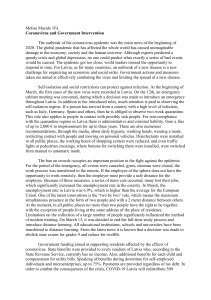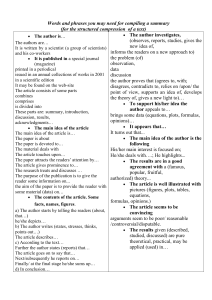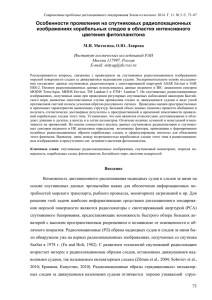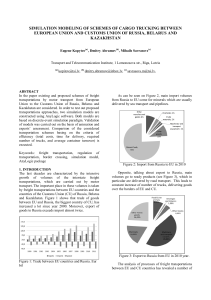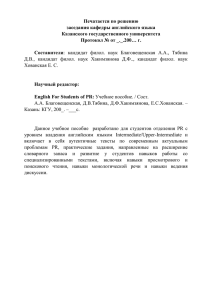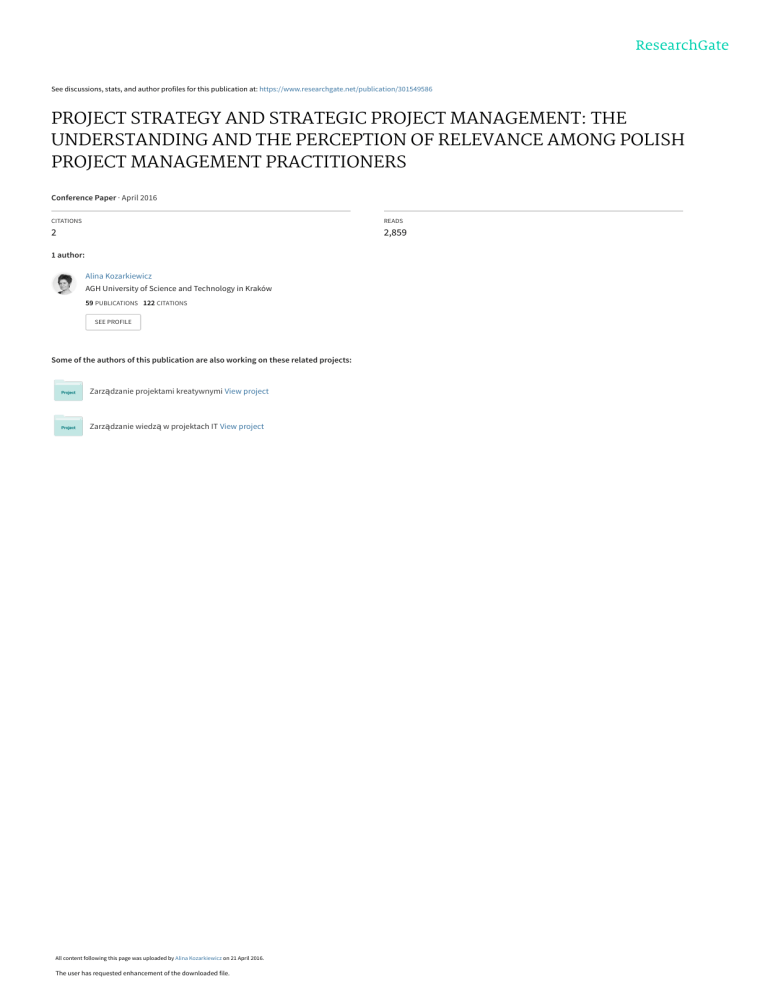
See discussions, stats, and author profiles for this publication at: https://www.researchgate.net/publication/301549586 PROJECT STRATEGY AND STRATEGIC PROJECT MANAGEMENT: THE UNDERSTANDING AND THE PERCEPTION OF RELEVANCE AMONG POLISH PROJECT MANAGEMENT PRACTITIONERS Conference Paper · April 2016 CITATIONS READS 2 2,859 1 author: Alina Kozarkiewicz AGH University of Science and Technology in Kraków 59 PUBLICATIONS 122 CITATIONS SEE PROFILE Some of the authors of this publication are also working on these related projects: Zarządzanie projektami kreatywnymi View project Zarządzanie wiedzą w projektach IT View project All content following this page was uploaded by Alina Kozarkiewicz on 21 April 2016. The user has requested enhancement of the downloaded file. Project Management Development – Practice and Perspectives Fifth International Scientific Conference on Project Management in the Baltic Countries CONFERENCE PROCEEDINGS Professional Associ ation of Project Managers Project Management Development – Practice and Perspectives ISSN 2256-0513 Project Management Development – Practice and Perspectives Fifth International Scientific Conference on Project Management in the Baltic Countries CONFERENCE PROCEEDINGS Conference is organized by the Faculty of Economics and Management, University of Latvia in cooperation with the Professional Association of Project Managers April 14-15, 2016 Riga, University of Latvia Professional Association of Project Managers CONTENTS Bargrizan Ali, Demarco Alberto (Italy). Estimation of the Project Cost by Nonlinear Method According to Different Managerial Attitudes .............................................................................................. 8 Beach Yvonne (United Kingdom). The Socio-political dynamics and complexity of organisational change projects: A research agenda........................................................................................................... 20 Bourne Lynda (Australia). The Secret Ingredient for Successful Project Leadership ............................ 31 Čiutiene Ruta, Venckuviene Vitalija, Dadurkiene Giedre (Lithuania). The Critical Factors for Project Team Collaboration in Developing New Products: Qualitative Perspective ............................................ 42 Daunorienė Asta, Bučinskienė Aurelija (Lithuania). Stakeholders Impact Analysis in Higher Education Study Projects ........................................................................................................................... 54 Dijksterhuis Eva, Silvius Gilbert (The Netherlands). The Design Thinking Approach To Projects . 67 Gasik Stanisław (Poland). A Conceptual Model of National Public Projects Implementation Systems .......................................................................................................................... 82 Goh Hui Hwang, Goh Kai Chen, Wan Sukri Wan Nur Zatil Shahida, Chua Qing Shi, Lim Jia Ji (Malaysia).Introductory of Renewable Energy Sources in ASEAN Countries and Green-Y Model for Predicting Fit-In Tariff in Malaysia ........................................................................................................... 94 Godfaurd A. John, A.Ganah (United Kingdom). Activity Theory Perspective for Project Management Research in the Built Environment ......................................................................................................... 104 Gustavsson Tomas (Sweden). Benefits of Agile Project Management in a Non-Software Development Context - A Literature Review ................................................................................................................ 114 Hamidi Nafiseh Monazam, Hamidimonazam Hamidreza, Hosseini M. Reza, Zaeri Fahimeh (Iran, Australia, New Zealand). Barriers to Adopting Building Information Modelling (BIM) Within South Australian Small and Medium Sized Enterprises .................................................................................... 125 Hamidi Nafiseh Monazam, Hamidimonazam Hamidreza, Hosseini M. Reza, (Iran, Australia). An Investigation Into Design-Related Risks Affecting Iranian Construction Projects ................................ 134 Hartlieb Stefan, Silvius Gilbert (Austria, The Netherlands). Dealing With Uncertainty in Projects: What Project Management Can Learn From Business Development ..................................................... 141 Ivanova Valentina (Bulgaria). Micro IT Projects Success Factors - A Small Scale Scientific Research ............................................................................................................................................... 159 Keleckaite - Andrijauskiene Meda (Lithuania). Improving the Ex-Post Evaluation of NGOs’ Projects by Involving the Individual Assessment of Social and Economic Effectiveness .................................... 162 Kozarkiewicz Alina, Kabalska Agnieszka (Poland). Project Strategy and Strategic Project Management: the Understanding and the Perception of Relevance Among Polish Project Management Practitioners ............................................................................................................................................. 187 Kuura Arvi (Estonia). Projects and Processes: Strangers or Cousins?.................................................. 197 Nechaeva Irina (Russia). Building information Modelling (BIM) in Construction Project Management in Russia ...................................................................................................................................................... 213 6 Contents Project Management Development – Practice and Perspectives Fifth International Scientific Conference on Project Management in the Baltic Countries April 14-15, 2016, Riga, University of Latvia Nuseibah Ala, Quester Caroline, Wolff Carsten (Palestine, Germany). Analysis Checklist for Research project Management: Aspects from European Research ........................................................ 226 Ozguler Ipek Sahra, Yilmaz Sertug (Turkey). The Impact of Personal Characteristics on Project Management ............................................................................................................................................ 234 Paterek Paweł (Poland). Effective Knowledge Management in Agile Project Teams - Impact and Enablers ................................................................................................................................................... 246 Polak Jarosław, Wójcik Przemysław (Poland). Interorganizational Cooperation in IT Project Management - Collaborative Project Management ................................................................................. 260 Pūlmanis Emīls (Latvia). Microeconomical Impact Factors In Project Management – Professional Liability (Indemnity) insurance For Project Managers’ .......................................................................... 270 Ratanova Inese, Bruņa Silvija (Latvija). The Tools of Controlling in the Control System of Project Management ............................................................................................................................................ 281 Reusch J.A. Peter, Reusch M.M. Sylvie (Germany). On Competences in Project Management and Lifelong Learning – EU Standards - Approaches with Thesauri and Competence Models ........................... 294 Reusch J.A. Peter, Reusch S. Pascal (Germany). How to shape Competences in Project Management? .......................................................................................................................................... 301 Reusch J.A. Peter, Reusch S. Pascal, José Ramón Otegi Olaso (Germany, Spain). Sustainability in Project Management Standards .............................................................................................................. 308 Sampietro Marco (Italy). Adoption and Evolution of Agile Practices.................................................. 312 Sander Tom, Sloka Biruta, Teh Phoey Lee (Germany, Latvia, Malaysia). Gender Difference in the Use of Social Network Sites Profiles to be Attractive for Project Manager ........................................... 324 Sidney Edidiong, Teslim Bukoye Oyegoke, Philpott Elly (United Kingdom). Project Management Tools and Technics in Private Construction Companies in Nigeria: A Case Study Approach................ 334 Silvius Gilbert (The Netherlands). Social Project Management? ......................................................... 341 Andri Dan Traustason, Hilmar Þór Hilmarsson (Iceland). Iceland – UK Interconnector: Is Proper Political Risk Mitigation Possible?.......................................................................................................... 350 Tsiga Zakari, Emes Michaels, Smith Alan (United Kingdom). Critical Success Factors for the Construction Industry .............................................................................................................................. 363 Tysak Wolfgang, Tietz Tobias (Germany). The impact of correlations in the critical field ................ 372 Uzulāns Juris (Latvia). Three Sources for the Project Risk Register Analysis ..................................... 381 Wolff Carsten , Wosniak Janne , Hensen Christian (Germany). Project Management for Technology Driven Small and Mid-Size Enterprises .................................................................................................. 391 Wiśniewska Magdalena, Stawasz Danuta (Poland). Critical Analysis of the Possibility of Application of Participatory Methods in Local Development Management in Poland. ............................................. 398 Contents 7 Project Management Development – Practice and Perspectives Fifth International Scientific Conference on Project Management in the Baltic Countries April 14-15, 2016, Riga, University of Latvia PROJECT STRATEGY AND STRATEGIC PROJECT MANAGEMENT: THE UNDERSTANDING AND THE PERCEPTION OF RELEVANCE AMONG POLISH PROJECT MANAGEMENT PRACTITIONERS Alina Kozarkiewicz, AGH University of Science and Technology, Cracow, Poland9; Agnieszka Kabalska, AGH University of Science and Technology, Cracow, Poland Abstract In the last years the issues of strategy and strategic management have been addressed frequently in the literature on project management. The notion about the role of project management in achieving business success is accepted broadly (Shenhar et al., 2001), and the search for more deep understanding of key elements of strategic project management is gradually becoming an important subject of research (Anderson and Merna, 2003). However, although the discussions on the significance of strategic orientation in project management are extended, there is still lack of a clear definition and common understanding of project strategy as well as of a coherent framework of strategic project management (Artto et al., 2008, Patanakul and Shenhar, 2012). Moreover, it seems that there is a disparity in the level of the theoretical development and practical understanding of the mentioned terms: project strategy or strategic project management. The aim of this paper is to demonstrate and discuss the results of empirical research conducted among Polish project management practitioners and oriented towards recognizing their viewpoints. The research questions were related to the understanding of mentioned concepts – project strategy, strategic project, strategic project management as well as the interpretation of the difference between strategic and operational project management. Not only the opinions, but also the differences in perceptions as well as the sources of such dissimilarities were investigated. As research results indicate, although the concept of project strategy is seen as very important, it is still ambiguous. There is a vast variety of opinions as to the most important components of project strategy and strategic management processes, as well as to the role of project managers in strategic processes. The influence of knowledge and experience along with social impact are observed. Key words: project management, strategic orientation, project strategy, strategic project JEL code: M10 Introduction Even the brief literature analysis reveals that in the recent years the matters of strategy and strategic management were discussed frequently in the project management publications. The opinion about the significance of project management in organization’s success is legitimate, as well as the pursuit of better understanding the essential elements of strategic project management process create an interesting research topic. Despite numerous discussions about the role of strategic orientation in project management, still there is no theoretical unification whatsoever. The definitions of project strategy, strategic project management or strategic project are still unclear and the differences between strategic and operational project management have not been exhaustively explained so far. Similar problems with the proper understanding of those concepts and their application in the business practice are common for managers which are working in everyday project implementation. 9 Corresponding author – dr hab. inż. Alina Kozarkiewicz akozarki@zarz.agh.edu.pl, Alina Kozarkiewicz, Agnieszka Kabalska 187 Project Management Development – Practice and Perspectives Fifth International Scientific Conference on Project Management in the Baltic Countries April 14-15, 2016, Riga, University of Latvia The aim of the article is to present the perception of the importance and understanding of such concepts as project strategy and strategic project management. In the first part of the article, on the base of the literature review, the fundamental ideas of project success, project strategy and strategic project as well as strategic project management are characterized briefly. In the second, empirical part of the article, the results of the research are presented and discussed. The discussion is focused not only on the explanation of the level of interest and acquaintance of the analyzed issues, but also on the determinants of perception and beliefs of Polish project management practitioners. Literature review The deliberations about the project strategy and the strategic project management should begin with the analysis of the importance of projects in contemporary strategic management. With no doubt, this is an important tool in the process of value initiation and creation and, what is more, in achieving competitive advantage (e.g., Jamieson and Morris, 2004, Anderson and Merna, 2003, Artto et al., 2007). In traditional, simplified approach, a successful project is implemented in planned time, with scheduled budget and with achievement of all intended goals. Nowadays, multidimensional approach in analyzing the sources of project’s success ‒ with the consideration of dynamics, complexity and uncertainty of the environment, implies the necessity of effectiveness of the project, the significant influence of the client, business and organizational success and its further relevance (Shenhar et al., 2001). According to various authors (e.g., Milosevic, 1989, Grundy, 2000, Shenhar, 2004, Srivannaboon, 2006) identification of the strategic projects is essential for achieving and supporting long-term goals of the organization. Strategic projects are the basis of the company’s development, attaining profits and effective implementation of changes; they are often connected with a considerable uncertainty, but their success is a source of attainable profits and long-term incomes. According to Asrilhant et al. (2004) strategic project has to possess particular characteristics, such as ability to a practical application and full supervision, the best reflection of business realities and the accordance with company’s mission and vision. In terms of foregoing assumptions, strategic project could be demonstrated as a theoretical and practical description of mechanisms which are providing the realization of the strategy. Strategic project management is a complex process focused on efficient usage of business opportunities and their translation into the feasible activities oriented towards value creation with reference to achieving long-term success of the organization. In this interdisciplinary approach, the main goal is to achieve the competitive advantage through differentiation and concentration on strategic goals by using project management strategy (DyReyes, 2008). Heerkens (2007) defines strategic project management as a sequence of patterns, mechanisms, processes, tools and behaviors which, together, help to determinate the scope in which the organization establishes effective relations between good practices in project management process and good practices in process of strategic goals implementation. According to Amram and Kulatilak (1999), the strategic project management is a two-stages process: the development and the control stage. If both stages are successfully implemented, the planned goals can be executed. Strategic project is properly managed when both phases are accomplished and as the result, the financial success is achieved (Asrilhant et al., 2004). After Stanleigh (2006), the important assignment for the organization is to conciliate the key information which could be used to identify and quickly implement those projects which do not have particular strategic 188 Alina Kozarkiewicz, Agnieszka Kabalska Project Management Development – Practice and Perspectives Fifth International Scientific Conference on Project Management in the Baltic Countries April 14-15, 2016, Riga, University of Latvia significance. Those type of projects do not demand specific attention, are not fundamental for the chosen business strategy, however they may generate costs, absorb resources and discourage the company’s client. Strategic project management should be based on the specific methodology which includes selecting projects from the strategic plan level through the analysis of possible significance of a particular project resulting from the evaluation of its influence on strategic goals and tasks. The methodology also includes the analysis in terms of implementing projects on various organizational levels in relation to the strategy as well as the integration of the leadership in project management, the competences and knowledge in organizational context (Jamieson and Morris, 2004). Although it could be presumed that not every project has a strategic importance for an enterprise, every project could be connected with the concept of the strategy. Project strategy might be defined as a specific perspective, position or a compendium of a directions regard to the project, which enable the indication and concentration on the main purposes of the organization and the ways of successfully and effectively achieving those objectives (Patanakul and Shenhar, 2012). According to the mentioned concept, project strategy should be considered in three main directions: the ,,why’’ perspective (e.g. business background, business goals, strategic concept), ,,what’’ position (e.g. product definition, value/competitive advantage, potential success/ failure criteria) and ,,how’’ instructions (e.g. project definition, strategic concentration). Anderson and Merna (2003) claim that project strategy is an advanced and complex plan which enables achieving project’s goals. Project strategy could also be understood as a project’s direction, which election provides the success of the project (Artto et al., 2008). This approach helps to analyze the strategy of a project in terms of the position which every project could achieve in the environment. Based on his analyses, Morris (2004) pointed at the important elements in the process of creating project’s strategy: processes of planning and integration, implementation of those plans and effective utilization of possessed knowledge and expertise. Project strategy is a missing component in project’s creation and implementation. Every project has its own, individual strategy that is a perspective, position and activities absolutely essential in defining what and how it should be done, to achieve competitive advantage and the best results of all the actions (Longman and Mullins, 2004). Project strategy should include following components: business perspective, assumptions, product, value, success and failure criteria, project definition and main strategic goals (Shenhar et al., 2007). As far as there were several attempts to unambiguously define the project strategy (Artto et al., 2008, Patanakul and Shenhar, 2012), the discussion about strategic project management is multi-dimensional: they are about success, value creation or competitive advantage and they are quite generally focused on the successful implementation of project’s strategy. According to Green (2005), the implementation of strategic project management needs an interdisciplinary approach which would provide the success of the whole process through its accurate and understandable definition, the alignment of project strategy and business strategy, the proper project portfolio management oriented towards the maximization of project value, and the achievement of leadership in project management. As a result of those referred activities, organization could achieve the balanced development and its competitive advantage. In the traditional approach to project management focused on operational perspective, the crucial issue was associated with the effectiveness of realization of goals; it was presumed that project could be described as a set of necessary activities which have to be done. In the new concepts, for instance Strategic Project Leadership based on adaptive approach, there is a clear concentration Alina Kozarkiewicz, Agnieszka Kabalska 189 Project Management Development – Practice and Perspectives Fifth International Scientific Conference on Project Management in the Baltic Countries April 14-15, 2016, Riga, University of Latvia not only on efficacy but also on effectuality (Shenhar, 2004). While applying Strategic Project Leadership concept in the practice, there are seven rules to be followed: leadership, strategic portfolio management, strategic project definition, creating vision and substance of a project, integration and knowledge. Similar approach towards the rising role of strategic project management was represented by numerous project management researchers. Meskendahl (2010) emphasizes the mutual influence of strategy on project management success and project management on the organization’s success. Anderson and Merna (2003) indicate a marked research gap in explaining how business strategy should be translated into projects. They also recognize the tendency to comprehend the strategic project management as a specific process linked to the project strategy concept which usually refers to the higher-level plan for achieving project’s goals. In this opinion strategic project management (selection, management and maintenance for many projects) enables the company’s development through the strengthen of its market position and the maximization of shareholders’ value. Summing up, the development and the evolution of strategy-focused approach to projects as well as strategy-oriented approach to project management allows to confirm the point that long-term success of the organization depends on the project’s success. Projects and strategic goals of an enterprise are mutually connected‒projects and the basis of the changes in the organization associated with its strategic objectives. Therefore, strategic objectives need to be successfully translated into projects’ goals. Research method The study presented below is based on the results of empirical research conducted periodically in five consecutive years 2011-2015. The research sample comprised project managers or members of project teams, as well as people regarding them as working for projectoriented companies. It means that the participants of the survey defined themselves as ‘project management practitioners’. The discussion about the project strategy was conducted online by the usage of a tool which allows the effective communication, i.e. a dedicated discussion board. The selection of the sample was based on a simple assumption‒the participation in the discussion was possible for every interested person, which on their own and voluntarily declared their will to participate and to share their observations and comments. In total, in the research participated 53 project management practitioners. The discussion on the online forum was moderated by one of the Authors of this paper, however her main role was more likely to watch over and to disallow moving away from the discussion’s subject or to encourage participants to continue the discussion. The moderator never suggested any given answers or has not shared her own beliefs about the subject. The aim of the empirical research was to learn about the interest and familiarity with the analyzed issues, as well as about the perception and beliefs of Polish project management practitioners. The set of opinions of project management practitioners which were gathered as the result of formulated questions concerned their understanding of such concepts as project strategy and strategic project management. The question was about: do project management practitioners notice the necessity of understanding the strategy and identifying strategic problems? Does every project have a strategy? What is a project strategy? What components do make a project strategy? What is the difference between strategic and operational project management? What is the role of project manager in strategic project management? Which 190 Alina Kozarkiewicz, Agnieszka Kabalska Project Management Development – Practice and Perspectives Fifth International Scientific Conference on Project Management in the Baltic Countries April 14-15, 2016, Riga, University of Latvia domain is the strategic project management ‒ the manager’s or the other stakeholders (the sponsor of the project or the PMO)? The recognition and the systematization of the collected options allowed to recognize some parts of the project management practice as well as to identify the plurality of the views, their determinants and the possible gap between theoretical deliberations conducted in literature of the subject and the opinions of project management practitioners. Research results In the first part of the inquiry, project management practitioners were asked about the necessity of understanding the project strategy and about the importance of the identification of strategic matters. It has to be underlined, that many of the debaters at the beginning of their statements emphasized the importance and the meaning of strategic issues in project management (In my opinion there is the lack of discussions on such important issue …)10 and recognized this topic as very inspiring for studying (I have read the opinions above and I have to admit some of them need my rethinking.). While trying to answer these questions, respondents emphasized the fact that they could not give the unambiguously respond (I do not know how to be clear in what I would like to express …), or when trying and explaining the matter, they tend to move away from the subject. Moreover, they often presented even contradictory arguments in their opinions. Summing up, in those parts of the discussion which were related to the main issue: ‘does the project have a strategy?’ three main plots could be recognized: 1. Many participants have emphasized the fact that every project has its objectives, so it also requires having the main idea of implementing these objectives, in other words: it requires the strategy; 2. Not every project has its own strategy; it is conditioned by the size and the scope of the project; large projects should have the strategy, but there are also smaller and less significant projects, (for instance the repair of the engine), here the term of project strategy is an overstatement; 3. The term ‘project strategy’ is often overused, for instance when the external stakeholders are considered, it does not create a sufficient condition to use the term ‘strategy’ properly. It should be underlined however, that many interlocutors were very easily mixing and confusing two terms: project strategy and strategic project, they used them jointly, regardless of the context. It seems to be interesting that in the discussions, many different ways of defining project strategy were applied. Table 1 includes the comparison of the most important definitions, as well as some illustrative opinions connected with these types of interpretation of the strategy. 10 Quotations from online discussion in italic. Alina Kozarkiewicz, Agnieszka Kabalska 191 Project Management Development – Practice and Perspectives Fifth International Scientific Conference on Project Management in the Baltic Countries April 14-15, 2016, Riga, University of Latvia Table 1 Project strategy definitions according to the interviewees No. 1. The nature of the project strategy according to the interviewees The goal ‒ the strategy is an idea, way of achieving the project’s objectives. 2. The environment (project’s environment) and the need to form the relations between the project and the environment. 3. Success ‒ strategy includes defining what is a project’s success and the ways of achieving it. The necessity of adaptation to the environment’s conditions ‒ implementing the project in the environment’s changing conditions requires adaptive activities, the scope and the methods of the adaptation needs the rules of reaction: the project strategy. The set of the key decision ‒ strategy is a set of important, long-term settlements, such as: choosing the suppliers or the technology. 4. 5. Illustrative opinions Strategy always means a plan to achieve goals. Each project manager has to know the direction ‒ without the strategy it would not be possible to define goals and to find the way how they could be achieved. The strategy must be about stakeholders and about their satisfaction, otherwise it would not be possible to think of business goals. There is a need to listen and react to the changes in the environment. We need a strategy to know our goals and when we achieve the goals we can celebrate project success. We have to be flexible nowadays, but we need to know the limits of our elasticity. Each project, when it starts, never has all the needed information, it is based on assumptions. And in order to minimize the risks the strategy should be followed. The role of project manager is to take decisions. Some of them are operational, but there are important matters, such as choosing the proper, eco-friendly, socially responsible supplier we can cooperate on long-term conditions. Source: authors’ construction The participant of the discussion emphasized the fact, that it is easier to discuss about the project strategy in the case of large projects (strategic projects) ‒ it these cases they could perceive the project strategy more clearly. The similar situation could be seen in the case of the organizations which are even established for implementing only one project (project finance) or for one particular large project (for example: Linux system). The discussion about the project strategy frequently included the answers related to the issue of the components of a strategy. The review of presented opinions and the brief analysis of its contents is provided by the following list: 1. Defining the project’s goals, performance objectives or performance targets, 2. Defining the success of the project on a different way than traditional understanding of the success: time, budget and scope, 3. The scope of the project’s changes, including the principles of permitting the initiation of the whole project or its consecutive stages, 4. Fundamental decisions about the scope and the quality, including the decisions as to technologies used or suppliers selected, 5. The set of project’s implementation scenarios. 192 Alina Kozarkiewicz, Agnieszka Kabalska Project Management Development – Practice and Perspectives Fifth International Scientific Conference on Project Management in the Baltic Countries April 14-15, 2016, Riga, University of Latvia It should be emphasized that both: in defining strategy and justifying individual definition of strategy ‒ including the most important components of the project strategy ‒ interviewees hardly ever referred to any definition quoted from the subject’s literature. The main reason of this behavior seems to be rather unofficial nature of the discussion and no judgment (appraisal) of the statements. Generally, the most dominant trend to refer to the individual and gathered experience or to some previous statements, rather than the publications. The next issue discussed during the research was about the strategic project management: do the strategic and operational project management should be distinguished? In respond to this question, in most cases the answer was positive, i.e. confirming the existence and importance of the strategic project management. In further part of the discussion, the interviewees pointed at the substantial activities (elements, stages) of building the strategic project management. The most important references are presented in the Table 2. Table 2 The essence of strategic project management according to the interviewees No. 1. 2. 3. 4. 5. 6. The most important actions or their context Making the strategic decisions ‒ the phase of conducting project’s decisions, analyzing different scenarios or variants of the decisions. Determining the rules of cooperation with the project’s stakeholders. Decision making in the conditions of the limited resources and with the restricted decision’s making margin. Superior phase in project management which is connected with decision making process from the control units. Maximizing the performance ‒ initiating the activities which would provide the highest profits from the project, stakeholder’s satisfaction, better organizational image, etc. Choosing the right project to implement. Exemplary statements (citations) Always there are possible variants of the project execution; it is not difficult to formulate scenarios, however – from my experience – much more difficult to choose the proper one. There are various expectations from the customers, suppliers, team members etc., and it is a part of strategic management to balance them properly. All the time we have to choose, to estimate, to select, and to make our choices understood. There are various levels of decision making in the company. The higher level takes the strategic decisions and then controls if they are implemented by project managers. We could not forget about the most important thing, i.e. about money (!). The shareholders (owners) expectations have to be fulfilled. In my company each project is verified from the point of company’s business goals and only the projects that are aligned are further considered for implementation. Strategic project management is about making choices as to the scope of project portfolio. Source: authors’ construction It has to be underlined that in this part of the discussion, references to the role of the project manager were observed quite frequently. The possibility of his/her independent key decisions or the role of other stakeholders in the process of creating project strategy was deliberated. According to the participants, the following points of view should be indicated: Alina Kozarkiewicz, Agnieszka Kabalska 193 Project Management Development – Practice and Perspectives Fifth International Scientific Conference on Project Management in the Baltic Countries April 14-15, 2016, Riga, University of Latvia - strategic decisions are made by project managers; the decisions have very complex nature; and they need the consideration of various determinants, not only economical but social as well, - project manager does not have the own self-reliance in making strategic decisions, moreover some of the respondents declare that ‘the project manager should not make those decisions on his/her own’, - strategic decisions belong to the Project Management Office or to the superiors of project managers. According to the quoted opinions, the points of view as to the project managers’ role are fairly diverse: from the total independency of the manager to the main role of PMO or the other stakeholders. One of the reasons of this variety of declarations might be the difference in the experience of the interviewees: their formal or informal position, years of working experience, or their role in the organization (employee, manager, PMO executive). Research conclusions and discussion The research results allows for many interesting conclusions. First, according to Author’s predictions, those participants who decided to take part in the study willingly, emphasized the importance of the project strategy and strategic project management and depicted them as interesting and inspiring matter. Simultaneously, they described these topics as a quite ambiguous and hard to produce straightforward or clear notions, sometimes even (according to the interviewees’ opinions) inclining them to modify their previous opinions. In every asked question there is a significant variety of answers and opinions, what is more, some misunderstandings or misconceptions are quite common, e.g. the concepts of project strategy and strategic project are often confused. Obviously, the mistakes in understanding those concepts were not common for everybody; sometimes the interviewees, even on purpose, differentiated those notions while focusing on the need of creating the clear, straightforward definitions. The interviewees indicated the important components which could be useful in defining project strategy: the scope, success, relations with the organization’s environment (adaptation, stakeholders’ expectations), the importance and long-term scope of the decisions. Likewise, the opinions about strategic project management could be summarized as follows: analyzing the options or the scenarios, making decisions about not only the projects as such but also about the possible alternatives of its realization, suppliers or technology, creating and maintaining the relations with the stakeholders, orientation on achieving project’s success criteria, including intangible criteria, such as for instance, the reputation of the organization. As it was mentioned before, in the collected opinions, the references to the literature were scarce; in the statements of discussion’s participants the typical vocabulary, such as e.g. competitive advantage, value creation etc. were uncommon. The main reason of those circumstances might be an informal character of the online forum. However, the important point is that the participants delivered very interesting points of views and very often, their opinions were in accordance to the definitions and views presented in the subject literature. There were gathered some significant observations about the relation between project strategy and the strategy of the organization, implementation of the strategy as the result of the projects and even the interpretation of the creation of organization strategy as a specific, peculiar project. On the 194 Alina Kozarkiewicz, Agnieszka Kabalska Project Management Development – Practice and Perspectives Fifth International Scientific Conference on Project Management in the Baltic Countries April 14-15, 2016, Riga, University of Latvia other hand, in the interviewees’ opinion, there were many clichés, unclear judgments such as ‘temporary strategy’ or ‘the person, who controls if the manager makes the right decisions’. Taking into consideration the determinants of participants’ judgments and opinions, it should be strongly emphasized that this type of the online research does not include the typical demographics part or the interviewees’ characteristics. According to the declared opinions and examples, the information about the represented sector was quite clear, especially in those opinions which concerned construction industry or IT. However, at this stage of the research it would be difficult to recognize and conclude about the influence of the sector, in other words, to determine the influence resulting from the specificity of the project the interviewees took part in. It should also be underlined that in the gathered comments, the fact that the opinions are based on the individual experiences was emphasized strongly and frequently ‒ it could be seen as a peculiar assurance from considering personal views and beliefs as an unquestionable or general truth. In this study, more noticeable was the influence of the professional background and certification. Especially the knowledge of a particular project management methodology (for instance PRINCE2)‒apparent references to some specific methodological concepts‒ were to be noticed. What is more, in those cases, the common practice was to use the rhetoric, which could be described as ‘an expert’s rhetoric’: someone who knows all the answers and who does not hesitate to announce it at any point. Conclusions Project strategy and strategic project management seem to be an interesting and inspiring subject, not only for research oriented towards theoretical investigations, but also based on surveys or case studies revealing the perception of these concepts by the practitioners of project management. The research presented in this paper, offers an inside into the opinions and declarations of Polish practitioners who willingly participated in the online survey. The variety of their opinions indicates the possibility of further research oriented towards recognizing the contingencies or determinants of their perception as well as the changes resulting from the development and popularization of project management knowledge. References Amram, M. & Kulatilaka, N. 1999. Disciplined decisions. Aligning strategy with the financial markets. Harvard Business Review, 77 (1), pp. 95-105. Asrilhant, B., Meadows, M. & Dyson, R. G. 2004. Exploring decisions support and strategic project management in the oil and gas sector. European Management Journal, 22 (1), pp. 63-73. Asrilhant, B., Dyson, R. G. & Meadows M. 2007. On the strategic management process in the UK upstream oil and gas sector" . Omega (35), pp. 89-103. Anderson, D.K. & Merna, T. 2003. Project Management Strategy– project management represented as a process based set of management domains and the consequences for project management strategy. International Journal of Project Management, 21(6), pp. 387-393. Artto, K., Kujala, J., Dietrich, P. & Martinsuo, M. 2008. What is Project Strategy? International Journal of Project Management, 26 (1), pp. 4-12. DyReyes, J. 2008. Strategic Project Management: Aligning Strategic Business Objectives with Project Management Strategy. University of Oregon, Applied Information Management: University of Oregon. Alina Kozarkiewicz, Agnieszka Kabalska 195 Project Management Development – Practice and Perspectives Fifth International Scientific Conference on Project Management in the Baltic Countries April 14-15, 2016, Riga, University of Latvia Green, S. 2005. Strategic Project Management: from maturity model to star project leadership. PMI World Congress. Heerkens, G. 2007. Introducing the revolutionary strategic project management maturity model (SPM3). Paper presented at the annual North American meeting of the Project Management Institute. Atlanta, GA. Jamieson, A. & Morris, P.W. G. 2004. Moving from corporate strategy to project strategy. In P.W.G. Morris & J. K. Pinto (Eds.), The Wiley Guide to Managing Projects, Hoboken, NJ: John Wiley & Sons, 177-205. Meskendahl, S. 2010. The influence of business strategy on project portfolio management and its success - A conceptual framework. International Journal of Project Management, 28(8), pp. 807-817. Morris, P.W.G. 2004. Implementing strategy through project management: the importance of managing the project front-end. In: Williams, T.M., Samset, K., Sunnevag, K.J., Basingstoke, (Eds.), Making Essential Choice with Scant Information: Front-end Decision Making in Major Projects, Palgrave Macmillan, pp. 39-67. Mullins J. 2004. Project management: key tool for implementing strategy. Journal of Business Strategy, 25 (5), pp. 54-60. Shenhar, A.J., Dvir, D., Levy, O. & Maltz, A.C. 2001. Project success: a multidimensional strategic concept. Long Range Planning, 34 (6), pp. 699-725. Shenhar, A.J. 2004. Strategic Project Leadership: toward a strategic approach to project management. R&D Management, 34 (5), pp. 569-578. Shenhar, A.J., Dvir, D., Guth, W., Lechler, T., Milosevic, D., Patanakul, P., Poli, M. & Stefanovic, J. 2007. Project strategy - the missing link. In: Shenhar, A.J., Milosevic, D.Z., Dvir, D., Thamhain, H. (Eds.), Linking Project Management to Business Strategy, Project Management Institute, Newtown Square, PA. pp. 57-76. Stanleigh, M. 2006. From crisis to control: New standards for project management. Ivey Business Journal (70), pp. 1-4. Patanakul, P. & Shenhar. A. J. 2012. What Project Strategy Really Is: The Fundamental Building Block in Strategic Project Management. Project Management Journall, 43 (1), pp. 4–20. 196 View publication stats Alina Kozarkiewicz, Agnieszka Kabalska
